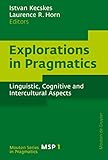Explorations in Pragmatics : Linguistic, Cognitive and Intercultural Aspects / ed. by Istvan Kecskes, Laurence R. Horn.
Material type: TextSeries: Mouton Series in Pragmatics [MSP] ; 1Publisher: Berlin ; Boston : De Gruyter Mouton, [2008]Copyright date: ©2007Description: 1 online resource (348 p.)Content type:
TextSeries: Mouton Series in Pragmatics [MSP] ; 1Publisher: Berlin ; Boston : De Gruyter Mouton, [2008]Copyright date: ©2007Description: 1 online resource (348 p.)Content type: - 9783110193664
- 9783110198843
- 306.44
- P99.4.P72
- online - DeGruyter
- Issued also in print.
| Item type | Current library | Call number | URL | Status | Notes | Barcode | |
|---|---|---|---|---|---|---|---|
 eBook
eBook
|
Biblioteca "Angelicum" Pont. Univ. S.Tommaso d'Aquino Nuvola online | online - DeGruyter (Browse shelf(Opens below)) | Online access | Not for loan (Accesso limitato) | Accesso per gli utenti autorizzati / Access for authorized users | (dgr)9783110198843 |
Browsing Biblioteca "Angelicum" Pont. Univ. S.Tommaso d'Aquino shelves, Shelving location: Nuvola online Close shelf browser (Hides shelf browser)

|

|

|

|

|

|

|
||
| online - DeGruyter A Grammar of Dolakha Newar / | online - DeGruyter Space, Time, and the Use of Language : An Investigation of Relationships / | online - DeGruyter Self-Reference in the Media / | online - DeGruyter Explorations in Pragmatics : Linguistic, Cognitive and Intercultural Aspects / | online - DeGruyter Visible Variation : Comparative Studies on Sign Language Structure / | online - DeGruyter The Collected Works of Edward Sapir. Volume I, General Linguistics / | online - DeGruyter The Grammar of Carnatic Music / |
Frontmatter -- Contents -- Introduction -- Part I: Philosophical and Linguistic -- Aspects -- What is language: Some preliminary remarks -- Toward a Fregean pragmatics: Voraussetzung, -- Nebengedanke, Andeutung -- Part II: Cognitive Aspects -- The role of explicature in communication and in -- intercultural communication -- Illocutionary constructions: Cognitive motivation -- and linguistic realization -- “A good Arab is not a dead Arab – a racist -- incitement”: On the accessibility of negated concepts -- Part III: Intercultural Aspects -- Developing pragmatics interculturally -- Formulaic language in English Lingua Franca -- Language evolution, pragmatic inference, and the -- use of English as a lingua franca -- On non-reductionist intercultural pragmatics and -- methodological procedure -- From downgrading to (over) intensifying: A -- pragmatic study in English and French -- Toward a universal notion of face for a universal -- notion of cooperation -- Backmatter
restricted access online access with authorization star
http://purl.org/coar/access_right/c_16ec
The papers in this volume reflect current trends in international research in pragmatics over recent years. The unique feature of the book is that the authors coming from ten different countries represent all aspects of pragmatics and address issues that have emerged as the result of recent research in pragmatics proper and neighboring fields such as cognitive psychology, philosophy, and communication. Recent theoretical work on the semantics/pragmatics interface, empirical work within cognitive and developmental psychology, intercultural communication and bilingual pragmatics have directed attention to issues that warrant reexamination and revision of some of the central tenets and claims of the field of pragmatics. In addition, cultural changes originating from globalization have affected the relation of language to the wider world. In particular, the spread of English as a global language has led to the emergence of issues of usage, power, and control that must be dealt with in a comprehensive pragmatics of language. Pragmatic theories have traditionally emphasized the importance of intention, rationality, cooperation, common ground, mutual knowledge, relevance, and commitment in the formation and execution of communicative acts. The new approaches to pragmatic research reflected in this volume, while not questioning the central role of these factors, extend the purview of the discipline to allow for a more comprehensive picture of their functioning and interrelationship within the dynamics of communication. The papers address these issues from a variety of directions. In Part I, Searle and Horn examine language use and pragmatics from a philosophical perspective. In Part II, the cognitive aspect of pragmatics is represented in the papers of Moeschler, Ruiz de Mendoza & Baicchi, and Giora. They focus on well-known domains such as illocutionary constructions, the pragmatics of negation, and the relevance-theoretic concept of explicature. However, each paper sheds new light on the familiar concepts. The papers in Part III by Mey, Kecskes and Grundy discuss the intercultural aspects of pragmatics while Terkourafi explores the explanatory potential of an interpretation of Grice's Cooperative Principle. Margerie's and Geeraert & Kristiansen's articles focus on the application of usage-based methodology in different ways within pragmatics.
Issued also in print.
Mode of access: Internet via World Wide Web.
In English.
Description based on online resource; title from PDF title page (publisher's Web site, viewed 28. Feb 2023)


